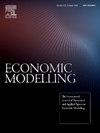From digital wallets to social dividends: How digital financial inclusion drives household prosocial behavior in China
IF 4.2
2区 经济学
Q1 ECONOMICS
引用次数: 0
Abstract
This study examines how digital financial inclusion (DFI) triggers prosocial behavior, shifting focus from its well-documented economic impacts to its understudied societal implications. Using longitudinal data from the China Family Panel Studies and city-level DFI indices, we find a 1 % DFI increase raises household donations by 1.47 % via three channels: household financial gains, reduced inequality perceptions, and improved well-being. Geographic peer effects emerge, with prosociality clustering spatially but fading with distance. Married and older heads weaken this relationship: marital status prioritizes family needs over social giving, while older heads’ limited digital skills hinder DFI adoption. These results position DFI as a dual tool—boosting economic engagement while fostering social cohesion—but reveal demographic constraints on its societal benefits. The findings inform policies balancing financial inclusion with social cohesion in developing contexts.
从数字钱包到社会红利:数字普惠金融如何推动中国家庭亲社会行为
本研究探讨了数字普惠金融(DFI)如何引发亲社会行为,将重点从其充分记录的经济影响转移到其未充分研究的社会影响。利用中国家庭面板研究和城市一级DFI指数的纵向数据,我们发现DFI每增加1%,家庭捐赠就会通过三个渠道增加1.47%:家庭经济收益、减少不平等认知和改善幸福感。地理同伴效应出现,亲社会性在空间上聚集,但随着距离的增加而减弱。已婚和年龄较大的负责人削弱了这种关系:婚姻状况优先考虑家庭需求而不是社会付出,而年龄较大的负责人有限的数字技能阻碍了DFI的采用。这些结果将DFI定位为一种双重工具——在促进经济参与的同时促进社会凝聚力——但也揭示了人口因素对其社会效益的制约。研究结果为发展中国家平衡普惠金融与社会凝聚力的政策提供了参考。
本文章由计算机程序翻译,如有差异,请以英文原文为准。
求助全文
约1分钟内获得全文
求助全文
来源期刊

Economic Modelling
ECONOMICS-
CiteScore
8.00
自引率
10.60%
发文量
295
期刊介绍:
Economic Modelling fills a major gap in the economics literature, providing a single source of both theoretical and applied papers on economic modelling. The journal prime objective is to provide an international review of the state-of-the-art in economic modelling. Economic Modelling publishes the complete versions of many large-scale models of industrially advanced economies which have been developed for policy analysis. Examples are the Bank of England Model and the US Federal Reserve Board Model which had hitherto been unpublished. As individual models are revised and updated, the journal publishes subsequent papers dealing with these revisions, so keeping its readers as up to date as possible.
 求助内容:
求助内容: 应助结果提醒方式:
应助结果提醒方式:


